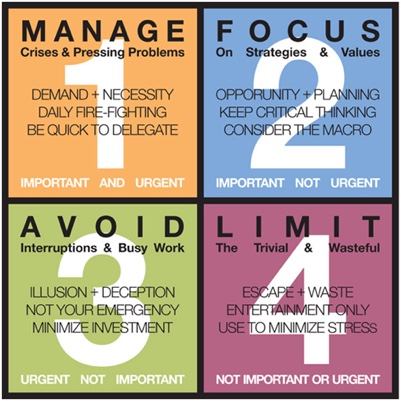Making Time for the Projects That Matter to You
The maxim, 'Nothing prevails but perfection,' may be spelled PARALYSIS.'― Winston Churchill
By Amanda Weiner
Recently I attended an event on “Culture and Leadership," and one of the panelists shared a tenet of her small startup organization: Progress at the expense of perfection. She went on to explain that in her organization, moving ahead with action—even if executed imperfectly—is better than staying still. This idea resonated with me and ever since, I have continued to ask myself: Where have I been stuck in a holding pattern on for fear of not being “perfect”? And if so, what is one small thing I can do to move towards progress?
I love nothing more than getting things done and checking things off my to do list, but for some reason I have found myself procrastinating one thing—writing this very blog post-—for weeks! After some reflection, I realized there are several reasons why I did not have time to work on this post; in spite of my nearly two decade career in HR and organizational development, I felt intimidated about writing a blog that others will find valuable in a world of gurus and abundant development resources across so many channels. While I genuinely wanted to reflect and write on a myriad of topics in my work, I let the fear of imperfection or worse, failure, take precedence over my desire to share my own voice and experiences. Then there’s the fact that each day always seems to bring more “urgent” work to focus on, and does not allow the "luxury" to write.
I know too well, from my coaching clients, that I am not alone in what I would call “selective procrastination.” We regularly put off the more challenging, forward-thinking and intensive work that really matters to us and our organizations. The excuses and barriers are infinite. Whether it’s a muscle we over-use at work that is tired or a muscle we under-use and are slow or seemingly less skilled in applying, or our flooded inbox, back to back meeting schedule, urgent fire drills, or difficult bosses and colleagues, it’s easy to get lost in the daily grind, and feel glad just to manage and survive each week.
In his timeless book, The 7 Habits of Highly Effective People, Steven Covey said that we should think about bucketing our time according to what is IMPORTANT vs NOT IMPORTANT in one axis and also URGENT vs. NOT URGENT along the other (below is the model without the quadrant labels). The goal is to move yourself to attending more time to upper right quadrant, which are the important and non-urgent matters which will pay dividends in future. (Scrolling Instagram probably falls in lower right quadrant to be clear?!)
How can you move forward?

If you too, like so many of our clients and all of us, can relate to the idea of “selective procrastination,” then perhaps one of the following ideas may help you move towards progress:
· Mine your life for habits that come easily. Usually there are things or areas in your life that you don’t procrastinate around. Can you think of a few? Okay, great - what are they? Now ask yourself, why do you think you have energy to get those things done, and what can you apply to other areas of your to-do list? For example, if you have a great habit of managing your personal finances but hate exercising, there may be insights to apply from that domain of competence, like joining an exercise class led by a trainer you admire in the same way you may look to a professional to help guide you in your investment decisions.
· Envision a new, appealing ritual around the area of work where you struggle. If you want to write (as I have wanted to write this blog for weeks) figure out the ideal conditions which typically help you to succeed and make it fun for yourself. Maybe you need spa or jazz from Pandora in background and a hip coffee shop with no Wi-Fi available for internet surfing? Maybe you need to grab that hibiscus lemon iced tea to get your creative juices going. Don’t deprive yourself! Make it fun.
· Do it first thing in the morning. One of my favorite podcasters and authors, Gretchen Rubin, loves to talk and write about life-hacks for procrastinators. You can read her full list of hacks HERE, but my personal favorite is to use the early part of the day. This tip is so simple, as it gives you no choice but to knock something out first thing in your day; when you wake up or get to the office to start your workday, whynot just focus on that one thing that’s hanging over you so you can be done with it?!
· Schedule 15 or even 5 minutes to start. The Heath Brothers, a favorite of author duo of ours here at Leading For Good, suggest in their book titled Switch: How to Change Things When Change is Hard to set the timer for 5 minutes to set a small time boundary when it comes to doing something you don’t want to do (and I got similar advice from my partner and fellow coach, Jennifer Bezoza). The idea here is that if you can just get started by telling yourself it’s only five minutes, then most likely by the time that time goes off you will want to keep going. And if not, then you accomplished what you set out to do and can feel good that you chipped away at the task!
· Get off social media to dedicate yourself to the work and things that matters to you. Recently, I saw a moving advertisement from a financial advisory company asking consumers the question of whether they spent as much time planning for retirement as they do responding to social media with likes. Powerful question, right? Cal Newport, a computer scientist, contributed this op ed in the New York Times last year, and essentially makes the point that we need to focus on the real work and contributions we want to make, not on the likes or social brand cultivated.
· Procastination is not always bad. Finally, we also want to acknowledge that there are cases where procrastination has advantages, such as the creative benefits you may get from a longer time horizon to think through a solution; you may be inspired by this New York Times article from Adam Grant (he is the opposite of a procrastinator and a prolific Wharton Professor).
Whatever gets you moving, it’s my hope that you too can find PROGRESS, NOT PERFECTION. Good luck and let us know what works for you!

